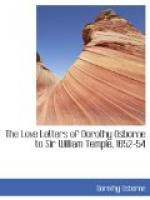But, bless me, what will become of us all now? Is not this a strange turn? What does my Lord Lisle? Sure this will at least defer your journey? Tell me what I must think on’t; whether it be better or worse, or whether you are at all concern’d in’t? For if you are not I am not, only if I had been so wise as to have taken hold of the offer was made me by Henry Cromwell, I might have been in a fair way of preferment, for, sure, they will be greater now than ever. Is it true that Algernon Sydney was so unwilling to leave the House, that the General was fain to take the pains to turn him out himself? Well, ’tis a pleasant world this. If Mr. Pim were alive again, I wonder what he would think of these proceedings, and whether this would appear so great a breach of the Privilege of Parliament as the demanding the 5 members? But I shall talk treason by and by if I do not look to myself. ’Tis safer talking of the orange-flower water you sent me. The carrier has given me a great charge to tell you that it came safe, and that I must do him right. As you say, ’tis not the best I have seen, nor the worst.
I shall expect your Diary next week, though this will be but a short letter: you may allow me to make excuses too sometimes; but, seriously, my father is now so continuously ill, that I have hardly time for anything. ’Tis but an ague that he has, but yet I am much afraid that is more than his age and weakness will be able to bear; he keeps his bed, and never rises but to have it made, and most times faints with that. You ought in charity to write as much as you can, for, in earnest, my life here since my father’s sickness is so sad that, to another humour than mine, it would be unsupportable; but I have been so used to misfortunes, that I cannot be much surprised with them, though perhaps I am as sensible of them as another. I’ll leave you, for I find these thoughts begin to put me in ill humour; farewell, may you be ever happy. If I am so at all, it is in being
Your
Letter 15.—What Temple had written about Mr. Arbry’s prophecy and “the falling down of the form,” we cannot know. Mr. Arbry was probably William Erbury, vicar of St. Mary’s, Cardiff, a noted schismatic. He is said to have been a “holy, harmless man,” but incurred both the hate and ridicule of his opponents. Many of his tracts are still extant, and they contain extravagant prophecies couched in the peculiar phraseology of the day.
The celebrated Sir Samuel Luke was a near neighbour of the Osbornes, and Mr. Luke was one of his numerous family. Sir Samuel was Lord of the Manor of Hawnes, and in the Hawnes parish register there are notices of the christenings of his sons and daughters. Sir Samuel was not only a colonel in the Parliament Army, but Scout-Master-General in the counties of Bedford and Surrey. Samuel Butler, the author of Hudibras, lived with Sir Samuel Luke as his secretary, at some date prior to the Restoration;




